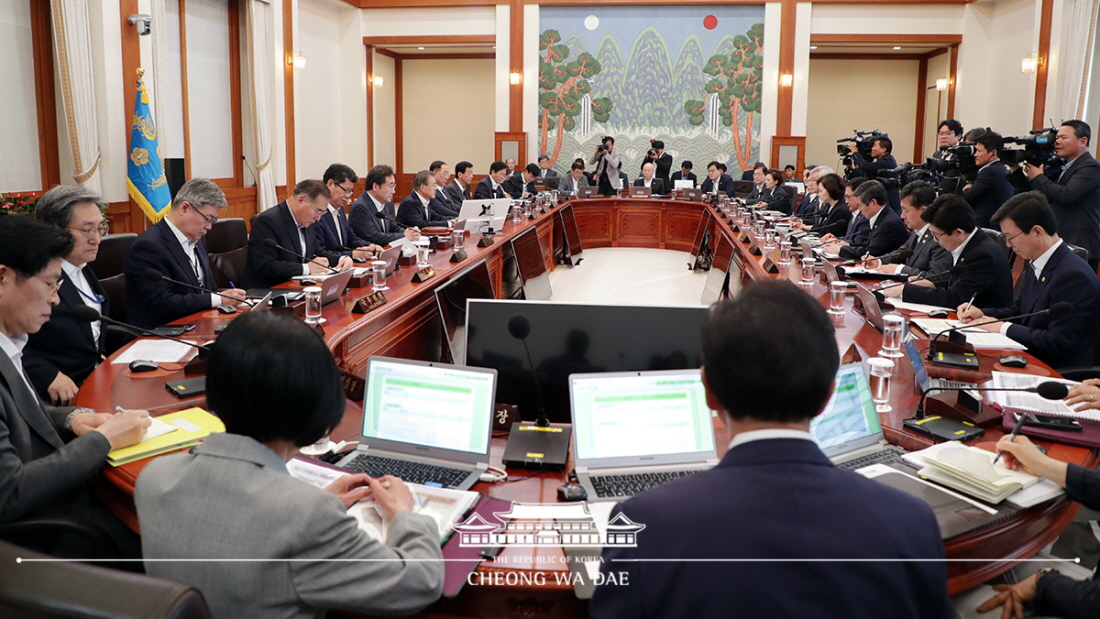이 웹사이트는 제19대 대통령 임기 종료에 따라 대통령기록관이 「대통령기록물 관리에 관한 법률」에 의해 이관받아 서비스하는 대통령기록물입니다. 자료의 열람만 가능하며 수정 · 추가 · 삭제는 불가능합니다.
다만, 「개인정보보호법」에 의하여 개인의 정보를 보호받기 원하시는 분은 관련 내용(요청자, 요청내용, 연락처, 글위치)을 대통령 웹기록물 담당자(044-211-2253)에게 요청해 주시면 신속히 검토하여 조치해 드리겠습니다. 감사합니다.
SPEECHES & REMARKS
BRIEFINGS

Let me begin the 26th Cabinet Meeting.
Last Sunday, Koreans and people around the world witnessed a historic moment at Panmunjeom. For the first time in the 66 years since the Armistice Agreement was signed, the leaders of North Korea and the United States, the parties concerned, clasped hands over the Military Demarcation Line, and the U.S. President, without any special security protection, was guided by the North Korean leader to step across the MDL to set foot on the soil of North Korea.
At the same time and place, a brief meeting among the three leaders of the two Koreas and the United States took place as well. With these actions, it can be said that – following the example of the two Koreas – North Korea and the United States declared a de facto end to hostilities and the full-fledged beginning of a new era of peace, even though a document was not signed.
I believe that North Korea-U.S. dialogue going forward will surely bear great fruit if that fact is always kept in mind, its meaning is contemplated and it is made into the foundation for dialogue.
Prior to that gathering, President Trump and I made a stop at a front-line guard post only 25 meters away from the MDL. It was the first time in history that the presidents of the Republic of Korea and the United States visited the Demilitarized Zone together. The people may have noticed more significance in this visit: the first in history for the two countries’ presidents to go to a front-line guard post in a suit and tie rather than military uniforms or bulletproof vests.
A U.S. commander briefed President Trump on the changes by comparing the tense situation near the MDL before the inter-Korean Agreement in the Military Domain signed September 19, 2018 to the peaceful situation after the Agreement.
I explained to President Trump that approximately half of the Republic of Korea’s population lives in Seoul and its metropolitan areas, which lie just about 40 kilometers away from the MDL and that over 100,000 U.S. citizens currently reside in Seoul. I also had an opportunity to inform President Trump about the positive effects the Gaeseong Industrial Complex, which we could see clearly in front of us, had brought about for the two Koreas’ economies and our security.
President Trump and I next took a look at articles unearthed during the recovery of remains going on at Arrowhead Ridge, and he said that he agreed with the urgent need for security and peace for the Republic of Korea.
All of these achievements were possible thanks not only that we leaders share among ourselves but also to the significant mitigation in military tensions between the two Koreas, through the measures such as the demilitarization of the Joint Security Area.
As I’ve always stressed, I’d like to emphasize yet again that improvements in inter-Korean relations and progress in North Korea-U.S. talks are in a mutually reinforcing cycle.
The Panmunjeom meeting between the North Korean and U.S. leaders, which moved the world, was made possible through President Trump’s unconventional proposal posted on a social media service and Chairman Kim Jong Un’s bold response. This unconventional proposal and bold response were the fruits of remarkable imagination that went beyond conventional wisdom. The meeting could never have been conceived within the confines of existing diplomatic protocols. Such imagination surprised and impressed the world and created a force that can advance the course of history.
As this case shows, imagination is as necessary for politics and foreign affairs as it is for culture and arts and science and technology. Most of all, imagination that goes beyond conventional wisdom is needed to resolve a critical situation. Imagination must be continually employed in order to resolve the truly difficult, historic tasks of complete denuclearization and the establishment of a permanent peace regime on the Korean Peninsula.
I believe that what our politics and I myself lack is imagination. I look forward to politics with abundant imagination that daringly goes beyond past political practices and policies. Each Government ministry and agency is making considerable efforts to overcome the hardships now faced by the Korean economy and the people in their daily lives. I ask you to move beyond working hard with good intentions as usual and demonstrate slightly bolder and more abundant imagination when formulating policies.



